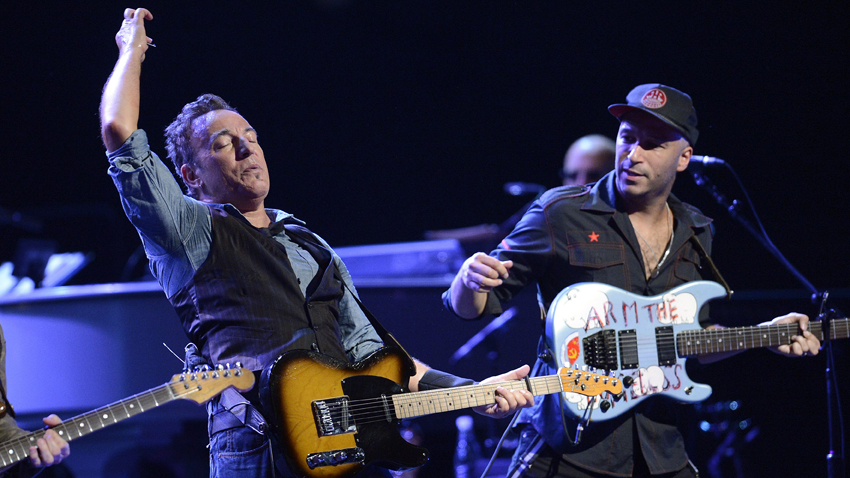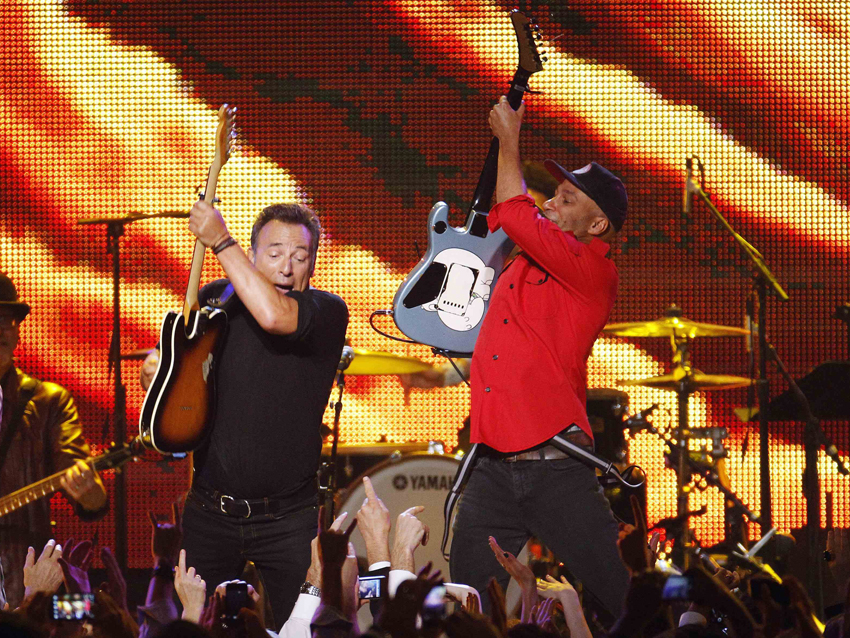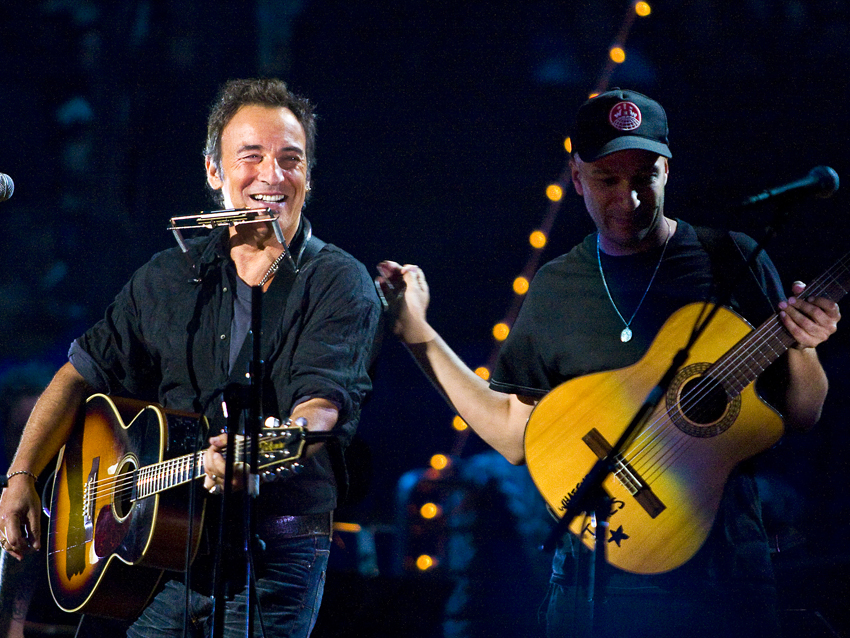
Want all the hottest music and gear news, reviews, deals, features and more, direct to your inbox? Sign up here.
You are now subscribed
Your newsletter sign-up was successful
Roundly hailed for his penetrating lyrical depth and his legendary go-for-broke showmanship skills, Bruce Springsteen's guitar playing prowess is frequently given short shrift by members of the axe community. But ask Tom Morello for his take on The Boss' six-string abilities, and you'll get some quick, effusive raves.
"Oh, he's a fantastic guitar player!" Morello says. "Without a doubt. I think that the guitar playing particularly on the album Darkness On The Edge Of Town is some of my favorite lead guitar playing on a record. It's fantastic."
Morello and Springsteen became friends back in 2008, after Bruce invited the Rage Against The Machine star on stage for a gig in Anaheim, California. Last year, when E Street Band guitarist Little Steven Van Zandt had to bow out of an Australian tour due to filming obligations for his Netflix show Lilyhammer, Springsteen tapped Morello to fill in for his longtime onstage foil.
The creative partnership between the two is now documented on Springsteen's new album, High Hopes, which sees Morello lending not only his signature guitar sound to a thrilling collection of tracks both new and revisited but his vocal talents as well. We spoke with Morello recently about how his association with Springsteen has evolved.
Bruce has referred to you as his "muse" for the making of this album. My goodness, I can't think of a nicer compliment.
[Laughs] "Well, that is kind of him to say. I wouldn't take that out of context, but I have to say that this whole experience has been such an honor for me. I'm a big Bruce Springsteen fan. You know, I'm one of those guys who... Check this out: Long before we met - this was sometime in the early '90s - I saw him dropping off videos at Tower Video on Sunset, and I had to restrain myself from going over and hugging his head. [Laughs]
"So to make a record with Bruce and to be on stage with the E Street Band, it's pretty phenomenal. I just try to do my best when called upon - that's the way I look at it. I've played a lot of guitar, I've been on a lot of records and a lot of stages, and I consider it a very special and unique event when I'm recording on a Bruce Springsteen song or I'm on stage with the E Street Band. I don't take it for granted for a second, and I just try to be at the top of my game."
Want all the hottest music and gear news, reviews, deals, features and more, direct to your inbox? Sign up here.
In all your other bands, you're the sole guitarist. Working with the E Street Band, however, you're sharing that sound with a lot of other players. What's that been like?
"It's been interesting - and exciting. Nils has a formidable presence as a guitar player; he's just spectacular. And Little Steven is certainly no slouch. So it's a real Black Oak Arkansas guitar thing on stage. [Laughs] But the one thing I've noticed when I've played with the E Street Band, even from the first times, is that the guitar intensity seems to rise a notch or two when we're all on stage together. I think that's something that's just bred into guitar players - when you're playing with other guitarists who are good, you want to be great, you know? In that regard, I think it brings out the best in everybody.
"As you said, I've been the only guitar player in the bands I've been in. But one thing I've missed in that is the trading solos business, which happens a lot with the E Street Band. And you don't know when it's going to be your turn, so you've got to always be ready. Sometimes it'll be during Murder Incorporated or E Street Shuffle; those are two that come to mind where Bruce might take the first solo, or he might give me the first solo, and then it goes over to Nils. You constantly try to feed off of what the other guys are doing."

On stage with Springsteen in Australia, February 2013. © DAN PELED/epa/Corbis
Sounds like basketball - you have to be ready for that ball.
"Yeah, yeah, yeah. It's pretty great."
Are you and Bruce trading solos on the newly recorded version of The Ghost Of Tom Joad?
"Yeah, we are. In the first second there, like in the live version, we go back and forth. I'm really proud to be a part of that recording of that song. The Ghost Of Tom Joad is one of my favorite songs in the Bruce Springsteen catalogue. The live version has felt so exciting in the room whenever we've played it together, and this studio one feels pretty great."
For the recording of that song, did Bruce give you direction or suggestions, or did he want to see what you'd come up with?
"Not on that one so much, but on other ones he certainly has. I did a lot of the recording at my home studio, Veritas Studios. With the song Harry's Place, I think did a few versions, and his notes were 'Try to make it sound like it's being played in a boozy, smoke-filled bar.' Or on another other song, one of his notes was 'Go for something elegant.' He'll talk in those terms, and I'll try to do something with it."
What about on some of the songs that he's revisiting on the record? On American Skin, would he say what he wanted to do differently?
"No, no. The initial stabs of them would be, he would just send the song over and I'd play whatever - rhythm guitar, lead guitar. I'd try to give him some options, because it's very different when you're playing on somebody else's record than when you're doing your own record. I would never try to guess his mind; I would just play the way I would play… in a few different shades of how I would play. There might be a mellower take or a more discordant take, and then I'd see which one fit his vision."
You and I have talked about your guitars in earlier interviews - your "misfit toys." Bruce has his own version of that, his famous Esquire. Have you ever played it?
"No, no, I haven't. I would look at it, though. [Laughs] It's exciting to see it."
The recording of this album was a little unorthodox. The band was in a couple of different studios at the same time in Australia, there was some work via iChat, and then you did some more work in LA when you got back. Was there a set plan to it all?
"You know, I don't know that Bruce ever records in an orthodox fashion, first of all, so I can only compare it to how I've recorded albums. I didn't even know that this was going to be a record, a record that was going to be released, until the plane ride back from Australia. Bruce had his headphones on and was doing something that appeared to be sequencing. I'm like, 'Sequencing? I know what that means - that means a record.'
"Until then, it had just been recording. When Bruce gave me a song to record on, I'd record it. We did one day in Sydney with the full E Street Band. Bruce and Jon Landau and Ron Aniello were shepherding whatever project was happening. I went to a studio one day with Nick DiDia - 'Here's three songs. Rock a solo on Harry's Place. Sing a background vocal on American Skin. Blow the roof off the place on Ghost Of Tom Joad.' And I'd be like, 'OK, what's next?'" [Laughs]
And you even got to sing your own verse on Tom Joad.
"Crazy, right?"
Does that set a vocal precedent on a Bruce record?
"I'm not the archivist, so I don't know. But we tried to do a faithful rendition of the live version, which has been such a powerful thing."
Either during soundchecks or backstage, would Bruce ever ask you about how you play? Is he ever, "Hey, Tom, how do that stuff you do?"
[Laughs] "At soundcheck, he would sometimes talk about some craziness that happened the night before on stage. And I would say, 'Hey, if you ever want, I'll show you.' But then he'd say, 'No, no, I'd rather not know.' I'd tell him, 'Dude, it's one part Randy Rhoads, one part PT Barnum.'"

Springsteen and Morello at The Clearwater Benefit Concert celebrating Pete Seeger's 90th birthday at Madison Square Garden, 2009. © Andrew Goetz/Corbis
What are you doing on the High Hopes solo? Is that a wah, the toggle switch?
"That one is the whammy pedal set to an octave below for the first part of the solo and then to an octave up for the second part. That's the wah pedal and the toggle switch."
So you've been doing the three-hour Bruce-a-thons on stage. When you go back to doing your own shows, are they going to feel like "no sweat"?
[Laughs] "There's a lot to be said for the epic journey. Every Springsteen show is The Lord Of The Rings Extended Edition - you get everything. Every emotional nuance can be covered in that amount of time. The one thing that I can't believe is how Bruce sings for that amount of time. That is truly the secret miracle of Bruce Springsteen. It's an unheard of thing.
"Plus, he's very physical - crowd-surfing, sliding around, standing on the piano - and he's singing the whole time. That's pretty astonishing. I do not intend to approach that in my own solo shows."
When you were recording, would Bruce discuss the meaning of the songs, the lyrics, as a way of influencing what you played?
"I don't think we had specific discussions. But like I said with Harry's Place, he talked about the guitar capturing the vibe, the scene. Even though we didn't have specific discussions, I am a big fan of the lyrics of Bruce Springsteen; I take them very seriously. Especially with Ghost Of Tom Joad - the solo on that is an attempt to conjure the screaming lost souls of social justice struggles past. The angry, avenging ghosts of the Tom Joads of history are what I tried to channel through my amplifier. That's what was in my mind when playing that solo."
Going back to the point of Bruce calling you his "muse," it must feel pretty incredible to have influenced some of his choices on this record.
"When I was making a Nightwatchman album with Brendan O'Brien in 2007 or 2008, he was in the other room tinkering with a Bruce song called Hunter Of Invisible Game. It caught my ear and I started eavesdropping a little bit. I thought, 'What a great, spectacular lyric that is.' But the song never came out.
"Cut to years later and I'm recording the jack-of-all-trades solo for Wrecking Ball in Bruce's studio in New Jersey. At one point I said to him, 'Whatever happened to a song called Hunter Of Invisible Game?' So he sent a dude to the vault to unearth that one. He brought it up, we listened to it, and I was just dumbstruck - what a spectacular song, a great recording, great lyric. I looked at him and said, 'Why don't you put that out. Or… you know, loan it to me!' [Laughs] And he just laughed and said, 'I got a million of 'em.'
"But Bruce was kind enough to loan me a song called Hey, Blue Eyes for my next record. It's a really great song. I'm looking forward to trying to do justice to it."
Joe is a freelance journalist who has, over the past few decades, interviewed hundreds of guitarists for Guitar World, Guitar Player, MusicRadar and Classic Rock. He is also a former editor of Guitar World, contributing writer for Guitar Aficionado and VP of A&R for Island Records. He’s an enthusiastic guitarist, but he’s nowhere near the likes of the people he interviews. Surprisingly, his skills are more suited to the drums. If you need a drummer for your Beatles tribute band, look him up.
